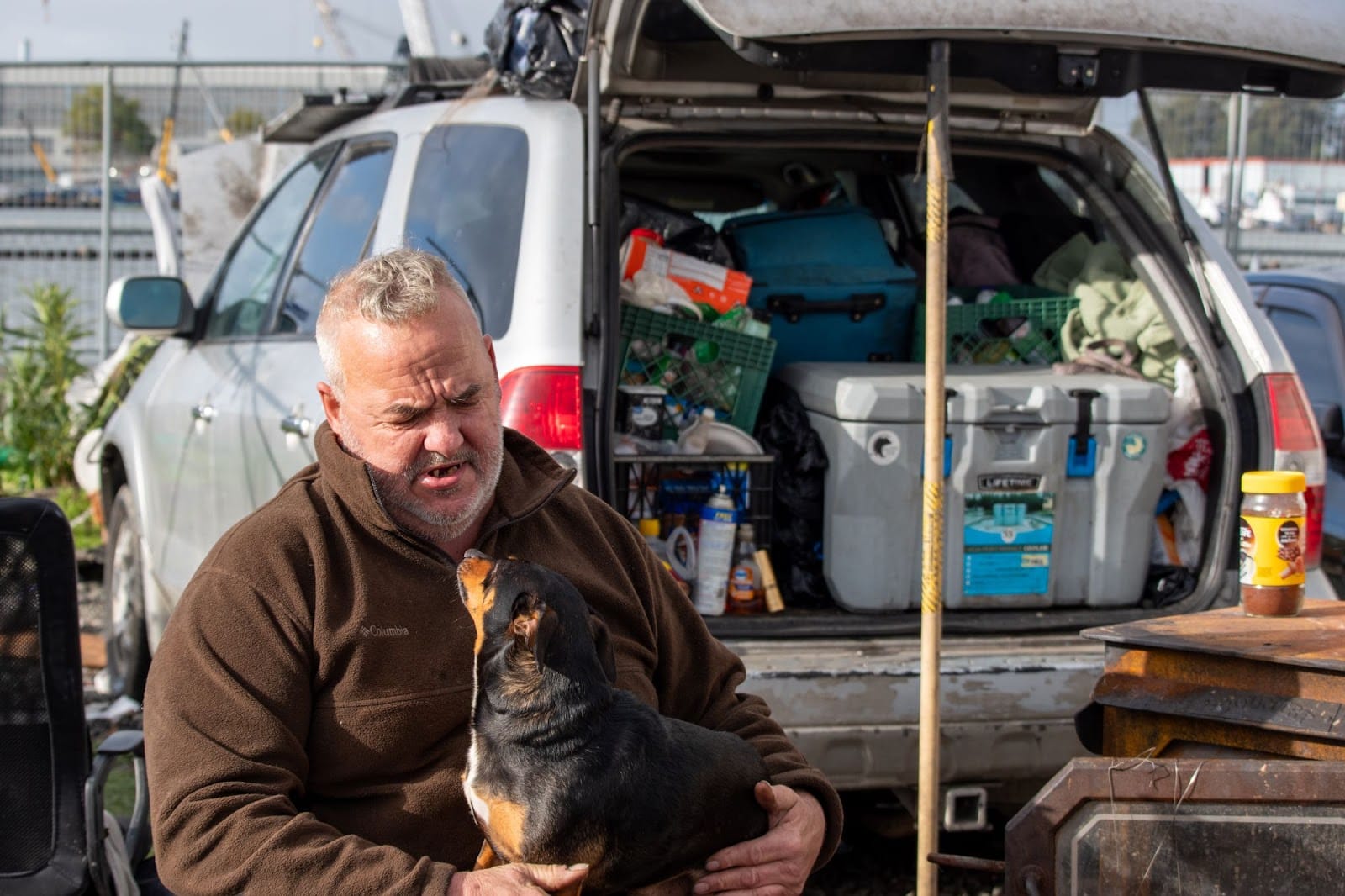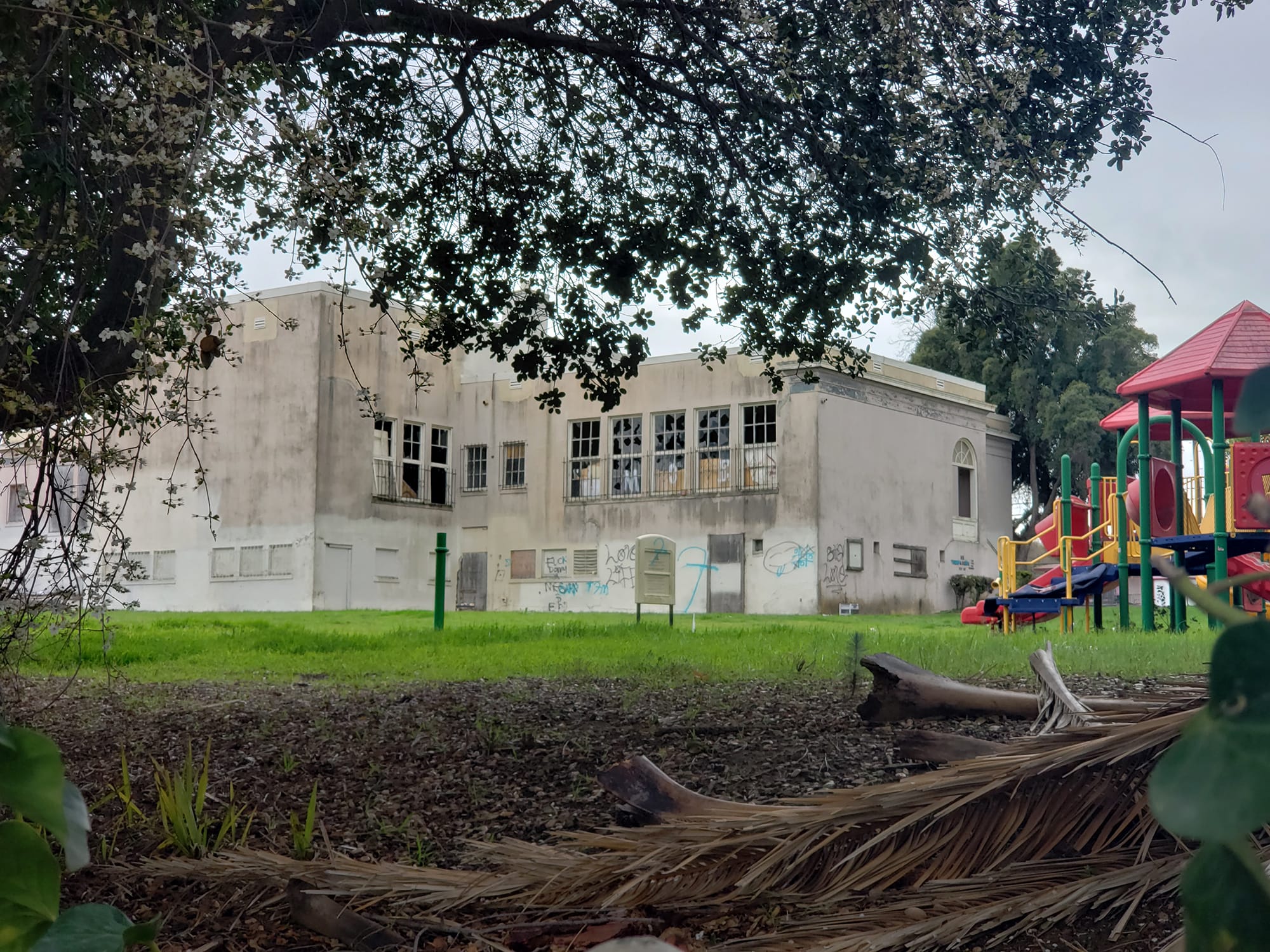VALLEJO — Vallejo broke with established leaders and moved to make a change in 2024, selecting a new crop of elected officials who will try and navigate the city’s complex challenges in the new year.
No incumbents were reelected to Vallejo City Council in 2024 as the city’s voters proved hungry for change, and a new city manager was appointed in May, opening the city to a new approach in governance.
But the new leadership still faces difficult issues that the city has grappled with for years. Supportive housing projects faced delays while encampment sweeps accelerated, and the Vallejo Police Department still has a severe staffing shortage.
New Mayor, City Council members and City Manager

The city will begin the new year with fresh new faces in the mayor and City Council seats, and with a new city manager who had not previously worked in Vallejo city government. The incumbents on the City Council were either termed out, defeated, or chose not to run for reelection.
Andrew Murray, who most recently worked as city manager of Pinole and interim public works director in Berkeley, was appointed by Vallejo City Council to the position of Vallejo City Manager last May.
Mayor-elect Andrea Sorce narrowly beat former two-term City Councilmember Pippin Dew in November’s election. Sorce is a professor of economics, chair of the city’s Surveillance Advisory Board and a co-founder of the Solano County chapter of the American Civil Liberties Union. She ran on a platform of government transparency, fiscal accountability and police reform, and has promised to bring a change to city government. Sorce will replace Mayor Robert McConnell, who had termed out.
Longtime Councilmember Rozzana Verder-Aliga is also leaving the council after she served her maximum two terms and unsuccessfully ran to represent District 3 in the California State Senate against Christopher Cabaldon. Nonprofit executive Alex Matias was elected to the District 1 seat formerly occupied by Verder-Aliga.
The remaining incumbents on City Council were, Councilmember Mina Loera-Diaz and Councilmember Cristina Arriola.
Loera-Diaz chose not to seek reelection for District 3. She will be replaced by San Francisco Housing Authority head Tonia Lediju, who ran unopposed. Arriola lost to Helen-Marie “Cookie” Gordon to represent District 6.
The remaining council members are all two years into their first term, with Peter Bregenzer representing District 5, Charles Palmares representing District 4 and Diosdado "JR" Matulac representing District 2.
California Forever

One of the biggest issues in Solano County in 2024 came when a mysterious group of investors announced plans to build a new city of up to 400,000 people between Fairfield and Rio Vista.
The company, calling itself California Forever, had been buying up land in the area for years and raised concerns that large swaths of land near an active U.S. Air Force base could fall under the control of hostile interests. The company also sued farmers who refused to sell their land, accusing them of collusion in violation of antitrust laws.
Finally, in 2024, California Forever was revealed to be an investment firm led by Czech Republic-born entrepreneur Jan Sramek and backed by several prominent Silicon Valley investors who envisioned a new city there. But the land was only zoned for agricultural use, so California Forever launched a petition drive to rezone the land.
The petition drive proved controversial and county residents complained that paid petitioners spread misinformation about the project and process. California Forever embarked on a massive public relations campaign but negative perceptions of the project persisted.
For example, the company announced in February that it would open its offices in downtown Vallejo for an artist showcase during the city’s 100th second Friday Art Walk.
The first California Forever Art Walk event was initially presented to the Art Walk organizers as a launch party for Vallejo 3rd Space, a new entity that popped up just as suddenly and mysteriously as Flannery Associates, the landowning subsidiary of California Forever.
“It wasn't until I walked into the space that I found out that it was California Forever,” Vallejo Art Walk artist liaison Victoria Preciado said. “And I was like, ‘Oh, that's interesting, they must be trying to have influence.’”
Aiden Mayhood, a founding member of the group Solano Together that formed to oppose the California Forever project, was at the California Forever Art Walk event in February, and said he thought the company was being disingenuous by drawing people in for art and then giving them a sales pitch for the project.
Sean MacCracken, a Vallejo resident who had set a table at a protest outside the venue during the March Art Walk, said that musicians who were booked to play music at the show decided to leave after they spoke to him.
“They just had to speak to us for a few moments before it was like, 'Oh, this is not what we're about,'” MacCracken said. “They went back inside and pulled their equipment and walked out.”
“The artists leaving for me was really a testament to how California Forever is operating,” MacCracken said. “They know they could never win us over by honest persuasion. So they think that they can just buy and sell us instead.”
The California Forever Vallejo office closed with no announcement, around the time that the company withdrew its voter initiative after a scathing assessment of the project’s potential impact in Solano County. But California Forever vowed they will return and will work with the county to bring the plan forward in another venue in the future.
Homelessness

Homeless camp cleanups accelerated in 2024 while housing projects have been further delayed.
Early in 2024, encampments at Enterprise Street adjoining a bike path construction project, and at city’s municipal boat launch on Mare Island Way, which was due to be repaved, were cleared in spite of the 9th Circuit Court of Appeals ruling in Martin v. Boise, which prohibited cities and counties from removing encampments unless there are enough shelter beds available.
The encampment sweeps accelerated after Martin v. Boise was overturned by the U.S. Supreme Court ruling in Grants Pass v. Johnson in June. The larger ones included the camps at Lewis Brown Drive near the Highways 9 and 37, Derr Street, River Park near the Mare Island Causeway, and White Slough at the north end of Sacramento Street.
While these encampment clearings have improved the appearance of the city in many areas, tents, RVs and makeshift shelters have been popping up in new locations, such as the east side of Wilson Park, as displaced residents seek new places to live.
The city’s attempts to launch shelters and housing facilities have been long-delayed. A navigation shelter project that promises to offer 125 shelter beds, individual case management and medical services, was initially targeted for completion in 2019. But increasing budget shortfalls and an environmental report that found that the original site was contaminated and unsuitable for human habitation have caused significant delays. The latest estimated opening date for the navigation center at its new Broadway Street location is in January.
Vallejo’s Project Homekey development, a 47-unit permanent supportive housing development that will be located at 2441 Broadway St., has also run into significant budget shortfalls and delays.
But even once those two projects are completed, it will still fall short of sheltering all the unhoused people in Vallejo. Solano County’s February 2022 point-in-time count estimated there were 454 unhoused people in Vallejo, a number that was blasted by Vallejo city officials as a gross under count. The 2024 point in time count estimated there were 665 unsheltered individuals. When the navigation center and Project Homekey projects open, only 172 of those people could be accommodated, around 25% of the estimated need.
Policing

Vallejo continued to grapple with a staffing shortage in the police department in 2024 as a state mandated reform program dragged on.
The city declared a state of emergency on police staffing in 2023 which allowed the police chief and city manager to defer conferring with the union when they need to make swift changes to address the staffing shortage. Interim police Chief Jason Ta has taken drastic steps to address the shortage by eliminating the department’s response to burglar alarm calls, dissolving the traffic division, and assigning detectives to the patrol division.
Vallejo is facing unique challenges in hiring and retaining officers. While departments across the region are facing similar difficulties recruiting, five officers who have left the department since March were recruited by other agencies. The Vallejo Police Officers Association, the union representing most Vallejo officers, blames the city’s political leadership, while community activists like civil rights attorney Melissa Nold point to several scandal-ridden officers who remain on staff and their support from the VPOA as a turn-off to retention and new recruits.
Gov. Gavin Newsom signed a bill in September that would allow retired Solano County Sheriff’s deputies to return to duty full time, clearing the way for the sheriff’s office to lend assistance to the beleaguered Vallejo Police Department.
Meanwhile, ongoing police reform work faced challenges in 2024. In 2023, the state Department of Justice announced that it would seek court oversight of the department after a three-year reform period ended with little progress. But the judge assigned to the case, Solano County Superior Court Judge Stephen Gizzi, was skeptical of the Justice Department’s efforts. The Justice Department sought to remove the judge from the case, but later withdrew it from the courts altogether.
One key required reform is the creation of a new Vallejo Police Oversight Commission. But while the city finally chose the members of that commission in 2024, it has faced lengthy delays to begin work.
The City Council adopted an ordinance to create the commission in December 2022, But implementation of the ordinance was delayed due to required “meet and confer” negotiations with the Vallejo Police Officers Association. The commissioners were appointed in late February 2024 and were sworn in on Aug. 20 after a background check.
The Vallejo City Council voted unanimously in November to postpone amendments to the city’s police commission ordinance until new councilmembers are seated in January after they received letters from community members and civil rights organizations expressing concerns that changes proposed by a settlement with the police union would reduce the commission’s power.
The commission members were not scheduled for their required training program, which can take as long as six months to complete, until late October, a month before a nine-month deadline after their appointment was set to expire. Any extensions must be approved by the City Council.
Schools

Vallejo schools took a significant step toward ending 20 years of state oversight in 2024, but the district is still facing challenges that could require it to close schools in the near future.
Former St. Helena Unified School District Superintendent Rubén Aurelio was hired as the new district superintendent with a mission to maintain and increase student attendance and prevent reductions in the district’s funding, which is tied to enrollment and daily student attendance.
The district took a major step towards achieving financial independence and stability by paying off a $60 million receivership loan from the state after 20 years last summer, but school closures could still be on the horizon.
“Paying off the loan is great news,” Aurelio said. “However it does not mean we’re now free to do as we wish. We’re still in the process of right-sizing a district that has been in declining enrollment for decades.”
But following public outcry, the district could rework the school closure plan. A district committee recommended closing Mare Island Health and Fitness Academy and reducing the student population of Loma Vista Environmental Science Academy. The committee also recommended that the board designate three other schools as surplus property, but the board declined to do so.
The prospect of school closures is unpopular with the community. During a November school board meeting, 17 community members spoke out against school closures, while no one supported them.
But when a Vallejo charter school sought to expand its operations downtown, it also faced fierce resistance. The City Council voted 4-3 in April to reject a proposed charter high school in downtown Vallejo, which would have been operated by Elite Public Schools.
Under the plan, Elite would redevelop a downtown office building at 241-255 Georgia St. as a high school for 400 students. Paul Beeman, a former Solano County judge who owns the office building next to the project site, appealed the planning commission’s approval of the project to the City Council. Residents opposed to the school also circulated a petition in opposition to the project, which was signed by more than 500 people.
The council’s decision came at the end of a series of charged and lengthy meetings where a number of residents expressed concerns that the project did not fit city planning goals of establishing downtown as an arts and entertainment district. Others said that the project would make the downtown unattractive to prospective businesses and could potentially bring violence or crime that occurs at other schools.
Supporters of the proposed downtown charter school shut down Vallejo City Hall with a sit-in
the following day, carrying signs comparing the city’s denial of the plan to redlining, the historical practice of denying access to homes because of race or economic status.
Elite Public Schools filed a lawsuit in the Solano County Court against the city of Vallejo on Aug. 1, citing a Brown Act violation and arguing that the council discriminated against students based on race and socioeconomic status. That case remains ongoing.
Arts

Numerous renowned rap artists have long called Vallejo home, but despite the city government awarding E-40 the key to the city in 2023, local venues and police pressure had largely deplatformed the city’s main cultural export.
That began to change in 2024, particularly as popular Vallejo rap artist LaRussell played a show to closed streets downtown and was Grand Marshall of the 2024 annual Mad Hatter Holiday Parade and Festival.
Although LaRussell had booked the occasional show at the Empress Theater, Vallejo’s iconic theater’s events calendar typically includes rock tributes or blues and soul revivalists – a long way from the hyphy hometown heroes that put Vallejo on the map. Vallejo’s live music venues rarely booked rap artists, so the artist rapped in front of Momo’s Cafe, on the sidewalk beside M&M Liquors, and in an event venue he built in his mother’s backyard dubbed “The Pergola.”
The shift seemed to come after LaRussell was booked to play downtown during an August Summer Nights event and packed a block with peaceful and happy fans.
LaRussell has since performed twice at Solano County Fairgrounds, held a Halloween candlelight concert at Suite Treatments and is now booked for three Sunday afternoon performances at the Empress Theater in January.
Street food vendors

The City Council passed new regulations for street food vendors in December, after months of complaints that unlicensed food vendors present a health hazard and cause traffic congestion and other nuisances, and from local restaurant owners who argued that street vendors were hurting their business.
The ordinance will take effect 120 days after the date of adoption, to allow time for outreach to street vendors and for an educational program about the permitting process as well as support to apply for permits and bring their cart or table to code.
Vendors will need a mobile food permit issued by the Solano County Department of Public Health. It will be mandatory to use hairnets and gloves, to carry a disposable container for trash, and to display their permit on the street-side portion of their cart or table, as well as on a city-issued badge on their clothing. Vendors will not be allowed to have an open flame, which will affect the vertical rotisseries that many street vendors use.
Vallejo plagued by rotten odors

Foul odors from the Vallejo Flood and Wastewater District, which are normally only noticeable a couple of blocks away from the water treatment plant, spread across South Vallejo and into downtown the Heritage District last March. The smells could persist for another six months.
Odor complaints spiked after the district began work to refurbish the south biofilter tower, a crucial piece of equipment at the city’s wastewater treatment plant. District Operations Superintendent Orlando Cortez said the district initially underestimated both the range of odors that would be released during the maintenance work, and the duration of the problem. The district reported that the work on the tower would be completed in November, but even though it was finished ahead of schedule, the odor complaints continued.
The district then identified a clogged odor scrubber as a source of the odors. The odor scrubber filters air from the two biofilter towers and other equipment. Vallejo Flood and Wastewater District general manager Mark Tomko said that work to refurbish the scrubber is now expected to be completed by the end of June.
Before you go...
It’s expensive to produce the kind of high-quality journalism we do at the Vallejo Sun. And we rely on reader support so we can keep publishing.
If you enjoy our regular beat reporting, in-depth investigations, and deep-dive podcast episodes, chip in so we can keep doing this work and bringing you the journalism you rely on.
Click here to become a sustaining member of our newsroom.
THE VALLEJO SUN NEWSLETTER
Investigative reporting, regular updates, events and more
- government
- policing
- Housing
- arts
- education
- Vallejo
- California Forever
- Andrea Sorce
- Alex Matias
- Helen-Marie Gordon
- Andrew Murray
- homelessness
- Art Walk
- Solano Together
- Jan Sramek
- Grants Pass v Johnson
- Project HomeKey
- California DOJ
- Vallejo Police Department
- Vallejo City Council
- Vallejo City Hall
- Ruben Aurelio
- Vallejo City Unified School District
- LaRussell
- music
- hip-hop

Gretchen Zimmermann
Gretchen Zimmermann founded the Vallejo Arts & Entertainment website, joined the Vallejo Sun to cover event listings and arts and culture, and has since expanded into investigative reporting.
follow me :




